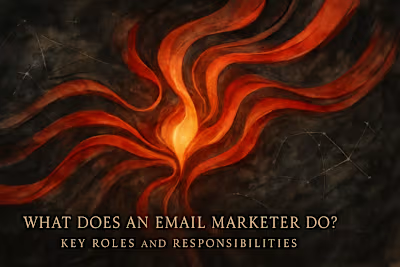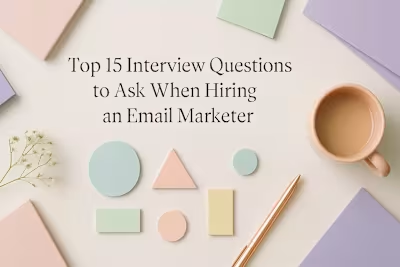10 Essential Email Marketing Skills to Look for in Your Next Hire

10 Essential Email Marketing Skills to Look for in Your Next Hire
Strategic & Creative Skills
1. Marketing Strategy and Campaign Planning
2. Copywriting and Content Creation
3. Audience Segmentation and Personalization
Technical & Analytical Skills
4. Data Analysis and Reporting
5. Marketing Automation Expertise
6. A/B Testing and Optimization
7. HTML/CSS for Email Design
Compliance & Management Skills
8. Deliverability and Compliance Knowledge
9. Project and Time Management
10. Collaboration and Communication
Conclusion
References
10 Essential Email Marketing Skills to Look for in Your Next Hire
When you decide to hire an email marketer, you're investing in a specialist who can directly impact your revenue and customer relationships. To ensure you make the right choice, it's critical to identify candidates with a well-rounded set of skills. This article breaks down the ten most important skills a successful email marketer must possess.
We'll also touch on how these skills are reflected in their daily tasks, a topic we explore further in our article on email marketer roles and responsibilities. Finding the right person starts with understanding what to look for, and writing a compelling job description that attracts candidates with these essential skills.
Strategic & Creative Skills
The best email marketers blend strategic thinking with creative execution. They need to see the big picture while also perfecting the small details that drive engagement.
Think of it this way: your email marketer is part chess player, part artist. They're planning moves ahead while crafting messages that resonate with your audience. Let's dive into the specific strategic and creative skills that separate great email marketers from the rest.
1. Marketing Strategy and Campaign Planning
A top candidate must be able to develop a comprehensive email strategy that aligns with business goals. This includes planning calendars, defining objectives, and understanding the customer journey.
Here's what this looks like in practice. Say you're launching a new product line. A skilled email marketer won't just send a single announcement email. They'll map out a full campaign strategy. This might include a teaser sequence building anticipation, a launch day email with exclusive early access, follow-up messages highlighting different product benefits, and targeted emails to segments who showed interest but didn't purchase.
They should also understand how email fits into your broader marketing ecosystem. Your email strategy shouldn't exist in isolation. It needs to complement your social media efforts, content marketing, and paid advertising. A strategic thinker will ask questions like: "How can our email campaigns support our Q4 revenue goals?" or "What role should email play in our customer retention strategy?"
Look for candidates who can demonstrate experience with:
Creating email marketing calendars aligned with business objectives
Developing multi-touch campaign sequences
Setting measurable goals and KPIs for campaigns
Understanding different stages of the customer journey
Integrating email with other marketing channels
2. Copywriting and Content Creation
The ability to write persuasive, clear, and engaging copy is non-negotiable. This skill applies to everything from compelling subject lines to effective calls-to-action (CTAs).
Great email copy does more than just inform—it connects. Your email marketer should write like they're having a conversation with a friend, not delivering a corporate memo. They need to capture attention in crowded inboxes and inspire action with their words.
Subject lines are particularly crucial. They're the gatekeepers of your email success. A skilled copywriter knows the difference between "Newsletter - March Edition" and "You're missing out on 30% savings (ends tonight)." One gets deleted. The other gets opened.
But it's not just about being clever. Effective email copy requires understanding your audience's pain points, desires, and language. A B2B software company needs different copy than a lifestyle brand. Your email marketer should adapt their writing style to match your brand voice while still maintaining that personal, engaging touch.
Key copywriting abilities to assess:
Writing attention-grabbing subject lines
Creating scannable, easy-to-read body copy
Crafting compelling CTAs that drive action
Adapting tone and style for different audiences
Telling stories that connect with readers emotionally
3. Audience Segmentation and Personalization
Modern email marketing relies on personalization. A skilled marketer knows how to segment lists and use dynamic content to deliver relevant messages that resonate with different audience groups.
Gone are the days of blast emails to your entire list. Today's consumers expect messages tailored to their interests and behaviors. A competent email marketer understands this and knows how to slice and dice your audience for maximum relevance.
Segmentation goes beyond basic demographics. Sure, age and location matter, but behavioral data tells a richer story. Your email marketer should segment based on purchase history, email engagement, website behavior, and customer lifecycle stage. They might create segments like "frequent buyers who haven't purchased in 60 days" or "newsletter subscribers who clicked on fitness content."
Personalization takes this further. It's not just about inserting someone's first name in the subject line. Advanced personalization might include:
Product recommendations based on browsing history
Content blocks that change based on subscriber preferences
Send time optimization based on individual engagement patterns
Dynamic pricing or offers based on customer value
The goal? Making each subscriber feel like the email was crafted just for them. Because in a way, it was.
Technical & Analytical Skills
Behind every successful email campaign is a foundation of technical knowledge and data-driven decision-making. These skills separate the amateurs from the professionals.
Email marketing might seem simple on the surface—write email, hit send, right? But underneath lies a complex web of technology, data, and systems. Your next hire needs to navigate this landscape confidently.
4. Data Analysis and Reporting
Proficiency in analyzing metrics like open rates, click-through rates (CTR), and conversion rates is essential. A great email marketer uses this data to measure ROI and make informed decisions to optimize future campaigns.
Numbers tell stories, and your email marketer needs to be fluent in this language. They should look at a campaign report and immediately spot opportunities and problems. A 15% open rate might be fantastic for one industry but concerning for another. They need context and benchmarks to make sense of the data.
But analysis goes deeper than surface metrics. A skilled marketer digs into:
Revenue per email sent
List growth rate and churn
Engagement trends over time
Attribution and customer lifetime value
Device and email client performance
They should also present this data in ways that make sense to stakeholders. Not everyone speaks "marketing metrics." Your email marketer needs to translate complex data into actionable insights. "Our welcome series generates 3x more revenue per recipient than regular campaigns" is more meaningful than "We have a 45% open rate."
Look for candidates who can demonstrate:
Experience with analytics platforms
Ability to create meaningful reports and dashboards
Understanding of statistical significance
Skills in identifying trends and patterns
Capacity to turn data into strategic recommendations
5. Marketing Automation Expertise
Candidates should have hands-on experience with email marketing platforms (like Mailchimp, HubSpot, or Klaviyo) to build automated workflows, nurture sequences, and other complex campaigns.
Automation is where email marketing gets really powerful. Instead of manually sending emails, a skilled marketer sets up intelligent systems that respond to subscriber behavior automatically. Think of it as having a tireless assistant who never forgets to follow up.
Your email marketer should be comfortable building:
Welcome series for new subscribers
Abandoned cart recovery sequences
Post-purchase follow-ups
Re-engagement campaigns for inactive subscribers
Birthday or anniversary messages
Lead nurturing workflows
But platform expertise means more than knowing which buttons to click. They need to understand the logic behind automation. When should a subscriber move from one workflow to another? How do you prevent overwhelming people with too many automated messages? What triggers make sense for your specific business?
Different platforms have different strengths. Klaviyo excels at e-commerce. HubSpot integrates deeply with CRM data. Mailchimp offers simplicity for smaller businesses. Your ideal candidate should either know your current platform or demonstrate the ability to learn new systems quickly.
6. A/B Testing and Optimization
Continuous improvement is key. A skilled marketer systematically tests different elements of their emails—such as subject lines, CTAs, and send times—to constantly improve performance.
Testing isn't about random experiments. It's about methodical improvement based on hypotheses. Your email marketer should approach testing like a scientist, changing one variable at a time and measuring the impact.
Common elements to test include:
Subject line length and style
Preview text variations
CTA button color, size, and copy
Email length and format
Image vs. text-heavy designs
Personalization elements
Send day and time
But here's what separates good testers from great ones: they test with purpose. Each test should answer a specific question. "Do our subscribers prefer discount percentages or dollar amounts?" "Does adding urgency to subject lines improve open rates?" They document results and build a knowledge base of what works for your audience.
Testing also requires patience and statistical rigor. A test with 50 recipients won't tell you much. Your email marketer needs to understand sample sizes, confidence levels, and when results are actually meaningful versus just random variation.
7. HTML/CSS for Email Design
While not always mandatory, basic knowledge of HTML and CSS is a significant advantage. It allows a marketer to customize templates and troubleshoot rendering issues across different email clients, ensuring a consistent user experience.
Email design is trickier than web design. Different email clients interpret code differently. What looks perfect in Gmail might be broken in Outlook. A marketer with HTML/CSS skills can diagnose and fix these issues quickly.
This doesn't mean they need to code emails from scratch. Most platforms offer drag-and-drop builders. But when you need to:
Adjust spacing that the builder won't allow
Add custom fonts or styling
Fix rendering issues in specific email clients
Create truly unique designs
Implement advanced responsive design
That's when HTML/CSS knowledge becomes invaluable. It's the difference between being limited by your tools and having complete creative control.
Plus, understanding code helps with deliverability. Bloated, poorly coded emails are more likely to trigger spam filters. Clean, efficient code improves your chances of reaching the inbox.
Compliance & Management Skills
Beyond strategy and tech, an effective email marketer must be organized, compliant, and a good collaborator.
The best email marketing skills in the world won't matter if your emails land in spam folders or your campaigns fall apart due to poor planning. These final skills ensure smooth, legal, and effective email marketing operations.
8. Deliverability and Compliance Knowledge
Understanding email regulations like GDPR and CAN-SPAM is crucial to avoid legal issues. This skill also includes knowledge of authentication protocols (SPF, DKIM) and list hygiene practices to ensure emails land in the inbox, not the spam folder.
Email compliance isn't just about avoiding fines (though those can be hefty). It's about building trust with your audience and maintaining a positive sender reputation. Your email marketer needs to understand:
Legal requirements:
GDPR compliance for European subscribers
CAN-SPAM requirements for US audiences
CASL regulations for Canadian contacts
Industry-specific regulations (like HIPAA for healthcare)
Technical deliverability factors:
Authentication protocols (SPF, DKIM, DMARC)
IP warming for new sending domains
List hygiene and bounce management
Spam trigger words and practices to avoid
Sender reputation monitoring
A knowledgeable marketer also implements best practices proactively. They'll set up double opt-in processes, maintain clear unsubscribe options, and regularly clean your email list. They understand that a smaller, engaged list performs better than a large list full of uninterested subscribers.
Deliverability is an ongoing battle. ISPs constantly update their algorithms. What worked last year might hurt you today. Your email marketer needs to stay current with industry changes and adapt strategies accordingly.
9. Project and Time Management
Email marketers juggle multiple campaigns, deadlines, and stakeholders. Strong organizational skills are necessary to manage the workflow efficiently and ensure timely execution.
Picture this: Black Friday campaigns, monthly newsletters, automated workflows, A/B tests, and a product launch sequence—all happening simultaneously. Without strong project management skills, something's getting dropped.
Effective email marketers create systems to manage this complexity:
Editorial calendars mapping out campaigns months in advance
Project management tools to track tasks and deadlines
Templates and processes to streamline repetitive work
Clear documentation for team members
Buffer time for unexpected requests or issues
Time management also means knowing when to say no. Not every "urgent" email request is actually urgent. A skilled marketer protects the strategic initiatives while still being responsive to legitimate needs.
They should also manage stakeholder expectations. If the sales team wants a campaign launched tomorrow, your email marketer needs to explain why proper planning and testing lead to better results. They balance being helpful with maintaining quality standards.
10. Collaboration and Communication
Email marketing doesn't exist in a silo. The ability to work effectively with designers, content creators, and other marketing team members is vital for creating cohesive and successful campaigns.
Your email marketer will interact with nearly every part of your organization:
Design team for email templates and graphics
Content team for blog posts and resources to promote
Sales team for lead nurturing and promotional campaigns
Customer service for feedback and common questions
Product team for feature announcements and updates
Leadership for strategy alignment and reporting
Strong communication skills help navigate these relationships. They need to translate technical email concepts into language others understand. When the CEO asks why open rates dropped, they explain seasonality and industry trends without getting lost in jargon.
Collaboration also means being a team player. The best email marketers share knowledge freely, document their processes, and help other team members understand email's role in the bigger picture. They celebrate shared wins and take responsibility when things go wrong.
Great collaborators also seek input proactively. They might ask customer service about common pain points to address in emails. Or work with the content team to repurpose blog posts into email series. These cross-functional partnerships often yield the most creative and effective campaigns.
Conclusion
Finding the right email marketer requires looking beyond basic qualifications. The ideal candidate combines strategic thinking with creative execution, backs decisions with data, and maintains the technical skills to bring campaigns to life. They understand that email marketing is both an art and a science.
As you evaluate candidates, remember that few people excel equally in all ten areas. Prioritize the skills most critical for your current needs. A startup might value automation expertise and technical skills. An established brand might prioritize strategy and creative abilities.
The best email marketers are curious learners who stay current with industry trends. They test constantly, analyze religiously, and always look for ways to improve. They understand that email marketing isn't about sending messages—it's about building relationships that drive business results.
Take time to assess these skills thoroughly during your hiring process. Ask for specific examples. Request portfolio pieces. Give practical exercises that demonstrate their abilities. The effort you invest in finding the right email marketer will pay dividends through increased engagement, revenue, and customer loyalty.
Your next email marketing hire could transform how you connect with customers. Make sure they have the skills to deliver on that potential.
References
Like this project
Posted Jun 14, 2025
Hiring an email marketer? Ensure they have these 10 crucial skills, from data analysis and copywriting to automation and compliance. Build a high-performing team.










